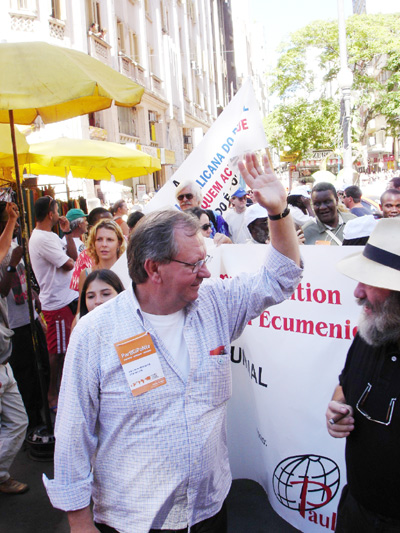
justice, peace & creation concerns
ecumenical earth
climate change / water / biotechnology / economic globalization & ecology
|
CARING FOR LIFE – Looking forward to the 9th Assembly “God, in your grace, transform the world” The theme of the forthcoming, Ninth, Assembly of the WCC (February 2006 in Porto Alegre/Brazil) is an invitation to look at the world as a place loved by God and permeated by God’s grace. Seen with the eyes of faith, this world can and must be transformed: from unjust to more just relationships, from environmental destruction to care for creation, from a world marked by the deadly consequences of sin to a world open to receive life out of the hands of God. It is a miracle that happens again and again when people in the midst of severe threats to their lives celebrate in worship the presence and power of God’s grace. With them we pray: “God, in your grace, transform the world.” “Another world is possible” was the motto of those who gathered in Porto Alegre for the World Social Forum in resistance against neo-liberal economic globalization and engaged in the struggle for alternatives. Christians have even more reasons to resist fatalism and to say: |
|
God created the world and will never stop caring for it (Gen 1-2) The loving relationship between the Creator, Redeemer and Sustainer of all creation is mirrored in our relationships with each other and with other life. These faith convictions inform the work of the churches together through the World Council of Churches as a fellowship of churches called to serve the unity of the churches and their witness to the world. Life – gift of God’s grace Remembering that all life is created by God and that God continues to care for it, we affirm the sacredness of all life and receive God’s gift of life that we share with all other creatures and all creation. Creation does not belong to us, but we belong to creation (Ps 104). The earth is not ours, but the common home for the entire web of life, the earth community. It is not us who sustain life, but God. There would be no life on earth without the energy of the sun, without air, water, and soil. All our human activities must recognise and respect the logic and rules (ecology and economy) of God’s greater household of life (oikoumene) in just and sustainable relationships that make for peace and the flourishing of communities. Justice as the essence of the love of God motivated the prophets in their critique of the destructive impact of injustice and misuse of power on people and earth. The prophets’ vision of the good life was rooted in God’s preferential option for the poor that was at the heart of the stories of Israel’s liberation from slavery and in the Sabbath and Jubilee vision of God’s good creation (Ex 21, Lev 25. Dt 15, Is 61). Jesus affirms this vision when he proclaims the jubilee year of the Lord (Lk 4) and teaches the disciples to liberate themselves from injustice, greed and fear of the future (Mt 6:19 ff), to serve God and not mammon (Mt 6:24), to trust in God’s love and care for all life (Mt 6:25ff) and to “strive first for the kingdom of God” (Mt 6:33). Jesus embodies the bread and the water of life (John 6:22ff.;7:37ff.). His body was broken and his blood shed for all (Lk 22:14ff.) so that all may have life and have it abundantly (John 10:10). Remembering the broken body of Christ and struggling for justice and peace, we anticipate God to transform this world in a radical way and to bring about a new heaven and a new earth when the day will come (Rev 21-22) Because we know the love of God revealed in Christ, we know the depth of human sin that leads to death and destruction and affirm the need for transformative justice. Because we look at Jesus on the cross, we see him in the suffering human sister and brother and the uproar of nature and affirm the love of the neighbor and of creation as central values of our faith and action. Motivated by the inspiring vision of life in its fullness, we accept our responsibility for each other and the earth. We do not shy away from the realities of this world and acknowledge the urgency of taking serious and decisive action. Very often the urgency of addressing growing inequality, poverty, wars, the threats to nature and the dramatic loss of biodiversity combined with the spread of diseases and the death and fragmentation of communities caused by HIV and AIDS is denied. The fear of loss sits deep especially among those who continue to benefit from unequally distributed economic growth and accumulation of wealth at the expense of the already poor and of nature. The vision of life as gift of God’s grace gives us confidence that we gain in quality of life when we stop the race to accumulate wealth and power in ever fewer hands, but rather accept our finiteness and resist the constant drive to economic growth and the injustice and misuse of power in the economic and political system and the use of military power supporting it. Our vision of life for all compels us to work together at all levels – locally, nationally and internationally - for transformation and change in solidarity with each other and with all people of good will. In the light of the Assembly theme, we need to ask ourselves:
All these questions can be summarized in just one: The Bible reminds us, we are people, not of fate, but of hope. We can change; we can take responsibility for our destiny and the destiny of creation in solidarity with each other and all life. The AGAPE process (Alternative Globalization Addressing People and Earth) initiated by the WCC-JPC team has spelled out the churches' response to the question “How do we live our faith in the context of globalization?” in exploring how God’s loving grace informs the critique of neo-liberal economic globalization and inspires action for an economy of solidarity in the service of life. The process has given great emphasis to the necessary integration of economy and ecology in the critique of the prevailing economic paradigm and as the basis for viable alternatives worthy of the name. Focusing on transformative justice, the AGAPE Call has brought together the concerns and struggles for social justice, eco-justice, racial justice, gender justice in one common struggle for transformation and change. The JPC Team is working on the vision of an ecumenical earth by building on and complementing the AGAPE Call with an emphasis on the ecological dimension, and on three foci in particular: Back to JPC - Ecumenical Earth page |
Martin Robra

